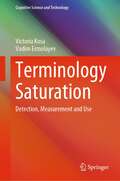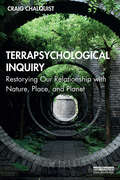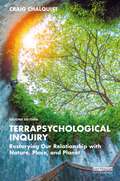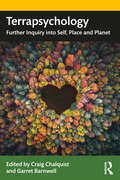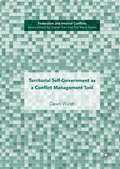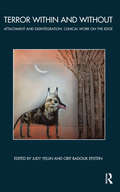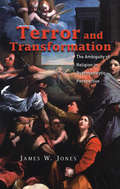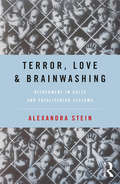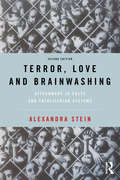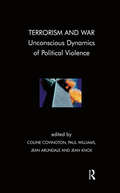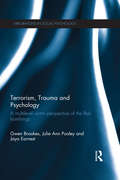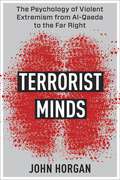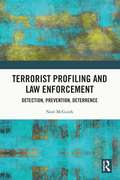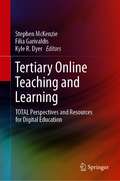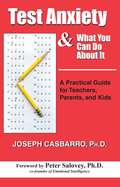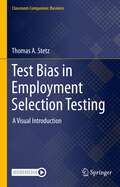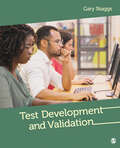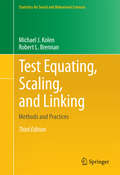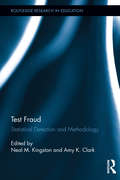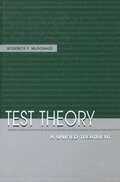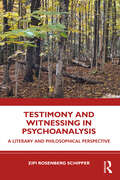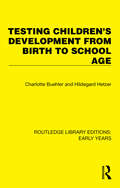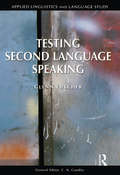- Table View
- List View
Terminology Saturation: Detection, Measurement and Use (Cognitive Science and Technology)
by Vadim Ermolayev Victoria KosaThis book highlights an innovative approach for extracting terminological cores from subject domain-bounded collections of professional texts. The approach is based on exploiting the phenomenon of terminological saturation. The book presents the formal framework for the method of detecting and measuring terminological saturation as a successive approximation process. It further offers the suite of the algorithms that implement the method in the software and comprehensively evaluates all the aspects of the method and possible input configurations in the experiments on synthetic and real collections of texts in several subject domains. The book demonstrates the use of the developed method and software pipeline in industrial and academic use cases. It also outlines the potential benefits of the method for the adoption in industry.
Terrapsychological Inquiry: Restorying Our Relationship with Nature, Place, and Planet
by Craig ChalquistTerrapsychological Inquiry is a qualitative research methodology seeking a form of inquiry that takes seriously our intense inner responses to the state of the natural world. Terrapsychology is a theory and practice approach that studies, from the standpoint of lived experience, how the world gets into the heart. Oceans and skies, trees and hills, rivers and soils, and even built things like houses, cities, ports, and planes: How do they show up for us inwardly? How do our moods, feelings, and dreams reflect what happens in the world? Terrapsychological Inquiry evolved over a decade of experimentation by graduate students, instructors, workshop leaders and presenters, and other embodied creatives to offer a truly Earth-honoring mode of story-based qualitative inquiry, one that changes all involved from passive spectators of the doings of the world into active, sensitive participants. Learn how to use this methodology of reenchantment in a variety of settings inside and outside academia, and by doing so reenter an animate world. Written in an engaging and accessible style, this introduction to a new research methodology will be of great interest to students and scholars of environmental psychology, ecotherapy, and environment and sustainability studies more generally.
Terrapsychological Inquiry: Restorying Our Relationship with Nature, Place, and Planet
by Craig ChalquistTerrapsychological Inquiry is a path of storied, imaginative research that takes seriously our intense inner responses to the state of the natural world. This place-rooted approach studies, from the standpoint of lived experience, how the world gets into the heart. Oceans and skies, trees and hills, rivers and soils, and even built things like houses, cities, ports, and planes: How do they show up for us inwardly? How do our moods, feelings, and dreams reflect what happens in the world? Terrapsychological Inquiry evolved over a decade of exploration by graduate students, instructors, ceremonialists, workshop leaders and presenters, and other practitioners of embodied creativity to offer an Earth-honoring mode of storied qualitative inquiry, one that transforms all involved from passive spectators of the doings of the world into active, sensitive participants. Learn how to use this methodology of earthly reenchantment in a variety of settings inside and outside academia and by doing so reenter an animate world. This new edition has been revised throughout and offers fresh insights into how Terrapsychological Inquiry, a field with roots in depth psychology, ecopsychology, and Hermetic philosophy, can also be used as an ecospiritual path. Thoroughly updated with a new chapter and added discussion questions and exercises at the end of each chapter, this introduction to an evolving research methodology will be of great interest to students and scholars of environmental psychology, ecotherapy, and environment and sustainability studies more generally.
Terrapsychology: Further Inquiry into Self, Place and Planet
by Craig Chalquist Garret BarnwellReflecting on and exploring the connection between the environments in which we live and our moods, motivations and dreams, this insightful volume takes the growing field of terrapsychology into new and exciting directions. This book draws together a group of contemporary voices in terrapsychology to explore lived topics, such as ecotransference encountered with sacred place, alternative mapping and expressions of solidarities with sacred sites, place dreaming, locianalysis, trans-species encounters, deep genealogy, terraplomacy and Hermeticism. The chapters focus on praxis, demonstrating how each author’s relationship with the more-than-human world has been reenchanted, revealing, remembering and co-creating relationships and community for life to flourish. Co-edited by Craig Chalquist and Garret Barnwell this collection will interest scholars, students and practitioners across a range of fields, including analytical psychology, environment psychology, and cultural anthropology.
Terrapsychology: Further Inquiry into Self, Place and Planet
by Craig Chalquist Garret Barnwell- The place of nature and environment is increasingly recognized in therapeutic theory and practice. - Co-edited by the originator of the theory of Terrapsychology. - Builds on his successful 2020 title, Terrapsychological Inquiry, which we also published.
Territorial Self-Government as a Conflict Management Tool (Federalism and Internal Conflicts Ser.)
by Dawn WalshThis book provides an in-depth narrative of the difficulties facing Territorial Self-Government institutions across Northern Ireland, Bosnia, the former Yugoslav Republic of Macedonia, Moldova, and Iraq. It brings together analyses of both prominent and lesser known cases to provide a broad overview of how Territorial Self-Government operates as a conflict management tool in different contexts. Drawing on lessons from these five cases, the author demonstrates the importance of designing and implementing international guarantees to self-government and the associated difficulties. Domestic capacity development must be encouraged and international actors needs to balance the guarantees aimed at providing stability with their wider security and economic concerns. The volume also strongly connects to broader research and theory on conflict management, particularly the role of institutional design and international assistance.
Terror Within and Without: Attachment and Disintegration: Clinical Work on the Edge (The Bowlby Centre Monograph Series)
by Orit Badouk-Epstein Judy YellinThis book explores the experiences of terror states in the consulting room. It examines how we might more adequately provide support and legitimacy within the profession for work 'on the edge', and explores the means by which individuals struggle to cope with exposure to war zones.
Terror and Transformation: The Ambiguity of Religion in Psychoanalytic Perspective
by James W. JonesReligion has been responsible for both horrific acts against humanity and some of humanity's most sublime teachings and experiences. How is this possible? From a contemporary psychoanalytic perspective, this book seeks to answer that question in terms of the psychological dynamic of idealisation.At the heart of living religion is the idealisation of everyday objects. Such idealisations provide much of the transforming power of religious experience, which is one of the positive contributions of religion to the psychological life. However, idealisation can also lead to religious fanaticism which can be very destructive. Drawing on the work of various contemporary relational theorists within psychoanalysis, this book develops a psychoanalytically informed theory of the transforming and terror-producing effects of religious experience. It discusses the question of whether or not, if idealisation is the cause of many of the destructive acts done in the name of religion, there can be vital religion without idealisation.This is the first book to address the nature of religion and its capacity to sponsor both terrorism and transformation in terms of contemporary relational psychoanalytic theory. It will be invaluable to students and practitioners of psychoanalysis, psychotherapy, psychology and religious studies, and to others interested in the role of religion in the lives of individuals and societies.
Terror, Love and Brainwashing: Attachment in Cults and Totalitarian Systems
by Alexandra SteinWritten by a cult survivor and renowned expert on cults and totalitarianism, Terror, Love and Brainwashing draws on the author’s 25 years of study and research to explain how almost anyone, given the right set of circumstances, can be radically manipulated to engage in otherwise incomprehensible and often dangerous acts. Illustrated with compelling stories from a range of cults and totalitarian systems, from religious to political to commercial, the book defines and analyses the common and identifiable traits that underlie almost all these groups. It focuses on how charismatic, authoritarian leaders control their followers’ attachment relationships via manipulative social structures and ideologies so that, emotionally and cognitively isolated, they become unable to act in their own survival interests. Using the evolutionary theory of attachment to demonstrate the psychological impact of these environments, and incorporating the latest neuroscientific findings, Stein illustrates how the combined dynamic of terror and ‘love’ works to break down people’s ability to think and behave rationally. From small local cults to global players like ISIS and North Korea, the impact of these movements is widespread and growing. This important book offers clarity and a unique perspective on the dynamics of these systems of control, and concludes with guidance to foster greater awareness and prevention. It will be essential reading for mental health professionals in the field, as well as policy makers, legal professionals, cult survivors, and their families, as well as anyone with an interest in these disturbing groups. Students of social and developmental psychology will also find it fascinating.
Terror, Love and Brainwashing: Attachment in Cults and Totalitarian Systems
by Alexandra SteinThis book explains how people can be radically manipulated by extreme groups and leaders to engage in incomprehensible and often dangerous acts through psychologically isolating situations of extreme social influence. These methods are used in totalitarian states, terrorist groups and cults, as well as in controlling personal relationships. Illustrated with compelling stories from a range of cults and totalitarian systems, Stein's book defines and analyses the common identifiable traits that underlie these groups, emphasizing the importance of maintaining open yet supportive personal networks. Using original attachment theory-based research this book highlights the dangers of closed, isolating relationships and the closed belief systems that justify them, and demonstrates the psychological impact of these environments, ending with evidence-based recommendations to support an educational approach to awareness and prevention. Featuring a foreword by John Horgan, the new edition has been fully updated to include recent work on political extremism and radicalization and totalitarian systems, as well as the recent highly publicized NXIVM case. Terror, Love and Brainwashing, second edition is essential reading for professionals, policy makers, legal professionals, educators and cult survivors and their families themselves.
Terrorism and War: Unconscious Dynamics of Political Violence
by Paul Williams Jean Knox Coline Covington Jean Arundale Lord John AlderdiceFollowing the attacks of September 11th 2001, one of the resounding questions asked was "What would make anyone do such a thing?" The psychological mentality of the suicidal terrorist left a gaping hole in people's understanding. This essential volume represents a much-needed effort to collate and examine some of the material already at our disposal as an encouragement to serious thought on this question and other related questions.'If terrorism is not new, what is it about the recent attacks that gives us a sense that something has changed? Is it the scale of the destruction, or the anxiety that we are facing some altogether new uncertainty? Are we in some sense facing a new enemy? ...In reflecting on these and other related questions we may be facing a similar watershed of understanding to that faced by Freud at the end of the Great War...In the absence of progress in our thinking today, political leaders and public opinion will likely turn to previous political and religious ideas, investing in them with a fundamentalist certainty that spells disaster.
Terrorism, Trauma and Psychology: A multilevel victim perspective of the Bali bombings (Explorations in Social Psychology)
by Gwen Brookes Julie Ann Pooley Jaya EarnestThis book provides a comprehensive insight into the multilayered effects experienced by directly affected victims and their indirectly affected family members following terrorist incidents and other world disasters. Chapters draw primarily on interviews with fifty victims of the Bali bombings, but also consider terrorist incidents including the London and Boston bombings, and disasters such as the Boxing Day tsunami and the Fukusima nuclear disaster. The book provides a detailed exploration of experiences and perceptions of those involved in the traumatic events, as well as their families, emergency response teams and community volunteers. Chapters discuss community responses to major incidents, appropriate non-medical models of intervention and vulnerable groups that may require special attention. The findings and analysis presented contribute to our understanding of the multilayered effects of terrorism on victims of all levels, and the importance of a planned and informed response, which includes the local community and its wealth of pre-existing resources. Terrorism, Trauma and Psychology: A multilevel victim perspective of the Bali bombing will be key reading for researchers and academics in the fields of social and clinical psychology, as well as scholars of victimology and terrorism studies.
Terrorist Minds: The Psychology of Violent Extremism from Al-Qaeda to the Far Right (Columbia Studies in Terrorism and Irregular Warfare)
by John HorganWhat makes a person want to become a terrorist? Who becomes involved in terrorism, and why? In what ways does participating in violent extremism change someone? And how can people become deradicalized?John Horgan—one of the world’s leading experts on the psychology of terrorism—takes readers on a globe-spanning journey into the terrorist mindset. Drawing on groundbreaking personal interviews as well as decades of research from psychologists and others, he traces the pathways that lead people into violent extremism and explores what happens to them as their involvement deepens. Horgan provides an up-to-date, evidence-based understanding of the patterns, motives, and mentalities of violent extremists from the Islamic State and al-Shabaab to white supremacists and incels. He argues that there is not a straightforward psychological profile of a terrorist, in part because of the great variety of today’s extremists, who are able to attract a more diverse pool of recruits than ever before. But even though there is no one-size-fits-all profile, psychological study can provide crucial insight into why and how people become terrorists.Accessible and nuanced, Terrorist Minds is an essential book for readers interested in what psychology can explain about extremist behavior.
Terrorist Profiling and Law Enforcement: Detection, Prevention, Deterrence
by Noel McGuirkThis book analyses the usefulness of terrorist profiling utilised by law enforcement officers as a pre-emptive means to assist them in the detection, prevention and deterrence of terrorism and/or its preparatory activities. It explores two main themes arising from the phenomenon of terrorist profiling: the lawfulness of terrorist profiling and the utility of profiling. These two themes are explored in three separate parts. Firstly, the book begins by drawing upon human rights concerns arising from the use of terrorist profiling by law enforcement officers. Secondly, an analytical framework capable of making determinations on the usefulness of terrorist profiling. This framework develops a profiling spectrum that ranges from formal and informal manifestations of terrorist profiling that forms the basis for evaluating its usefulness. Finally, the book presents an examination of various manifestations of terrorist profiling by separating the analysis of the ‘construction’ of profiles on the one hand, from their ‘application,’ on the other, so as to be able to identify and examine profiling’s usefulness as a technique to assist law enforcement officers make predictions about likely offender characteristics. This book ultimately concludes that terrorist profiling should only be conducted by undertaking a systematic assessment of the construction of profiles separate from the application of profiles whilst simultaneously taking into account fundamental human rights concerns with the practice of terrorist profiling. The work will be an essential resource for academics, law enforcement officers and lawyers in the disciplines of law, criminology, human rights, criminal justice and policing. As the book engages with terrorist profiling, it will also be of interest to those engaged in the psychology of terrorism.
Tertiary Online Teaching and Learning: TOTAL Perspectives and Resources for Digital Education
by Kyle R. Dyer Stephen McKenzie Filia GarivaldisThis book is the first comprehensive and integrated guide to online education. It systematically presents all aspects of the emerging “big picture” of online education, providing a broad range of information and insights from online experts, learners, teachers, developers and researchers.The book introduces readers to online education and reveals its potential for bringing about a paradigm shift in education. It describes avenues for increasing the value of the online education medium and examines techniques for improving the online student experience. It also offers a wealth of real-world examples and experiences and shares recommendations on how to improve them, provided by students, teachers, developers, and researchers.Accordingly, the book equips readers – including online learners, teachers, researchers, developers, and administrators – to optimally participate in and contribute to current and future online education advances.
Test Anxiety and What You Can Do About It: A Practical Guide for Teachers, Parents, and Kids
by Joseph CasbarroHigher standards and greater accountability have contributed to an alarming rise in test anxiety in our students. To help them pass mandated assessments, teachers drill on facts and give endless practice tests. But teaching to the test isn't enough. High stakes testing produces high anxiety that, in turn, lowers performance. Teachers, parents, and kids must do more to minimize its negative effects and increase test results. But where do we begin? Test Anxiety & What You Can Do About It offers constructive and powerful strategies that specifically target the physical, emotional, and cognitive symptoms of anxiety. This book serves as a comprehensive and practical guide for test- takers of all ages. It is an essential resource for teachers and parents of students who are faced with the increased testing mandates of the No Child Left Behind Act Take control! Increase understanding, enhance recall, regulate emotions, and improve test performance through the reduction of test anxiety. This book is the right resource at the right time!
Test Bias in Employment Selection Testing: A Visual Introduction (Classroom Companion: Business)
by Thomas A. StetzThis book provides students with a concise introduction to test bias from a psychometric point-of-view without statistics. It uses easy to understand graphs to explain complex technical approaches to test bias giving readers a highly sought-after knowledge enabling them to be better consumers of tests.Studies performed by the Society for Human Resource Management (SHRM) consistently show that selection is a key competency for Human Resource (HR) professionals. Knowledge of test bias is a key component to effectively and legally performing this highly valued HR function. Unfortunately, test bias is rarely covered in HR classes or is presented in a highly technical manner geared to individuals with strong statistical and mathematical backgrounds. This book, requiring no previous statistical or mathematical knowledge, can be used as a supplemental textbook for any class that deals with selection, staffing, or measurement at the undergraduate or graduate level.
Test Development and Validation
by Gary Edward SkaggsTest Development and Validation by Gary Skaggs summarizes the latest test theories, frameworks for test development and validation, and guidance for developing tests in straightforward language in one core text. Students looking for clear, concise explanations of measurement, validity, and test development within a real-world context and with numerous examples will find this book to be an excellent learning resource. Author Gary Skaggs takes years of experience teaching test development to graduate students across social and behavioral sciences and consulting on a wide variety of government and institutional research projects to offer students a thorough, jargon-free, and highly applied book to help propel their own research and careers. Part I of the book, The Big Picture, sets the stage for test development, placing it within the larger context and history of measurement, emphasizing measurement concepts and their evolution over time. Part II, Test Development, covers the technical details of instrument and test development in logical order. Validation, Part III, links the conceptual bases provided in Part I with the technical process provided in Part II to conclude the book. For those students wanting to go further, software suggestions are referenced in the technical chapters, while Further Reading sections offer the original sources for more details. Exercises and Activities at the end of each chapter provide students a variety of ways to apply their knowledge, from conceptual questions to brief project ideas to data analysis problems.
Test Development and Validation
by Gary Edward SkaggsTest Development and Validation by Gary Skaggs summarizes the latest test theories, frameworks for test development and validation, and guidance for developing tests in straightforward language in one core text. Students looking for clear, concise explanations of measurement, validity, and test development within a real-world context and with numerous examples will find this book to be an excellent learning resource. Author Gary Skaggs takes years of experience teaching test development to graduate students across social and behavioral sciences and consulting on a wide variety of government and institutional research projects to offer students a thorough, jargon-free, and highly applied book to help propel their own research and careers. Part I of the book, The Big Picture, sets the stage for test development, placing it within the larger context and history of measurement, emphasizing measurement concepts and their evolution over time. Part II, Test Development, covers the technical details of instrument and test development in logical order. Validation, Part III, links the conceptual bases provided in Part I with the technical process provided in Part II to conclude the book. For those students wanting to go further, software suggestions are referenced in the technical chapters, while Further Reading sections offer the original sources for more details. Exercises and Activities at the end of each chapter provide students a variety of ways to apply their knowledge, from conceptual questions to brief project ideas to data analysis problems.
Test Equating, Scaling, and Linking
by Michael J. Kolen Robert L. BrennanThis book provides an introduction to test equating, scaling and linking, including those concepts and practical issues that are critical for developers and all other testing professionals. In addition to statistical procedures, successful equating, scaling and linking involves many aspects of testing, including procedures to develop tests, to administer and score tests and to interpret scores earned on tests. Test equating methods are used with many standardized tests in education and psychology to ensure that scores from multiple test forms can be used interchangeably. Test scaling is the process of developing score scales that are used when scores on standardized tests are reported. In test linking, scores from two or more tests are related to one another. Linking has received much recent attention, due largely to investigations of linking similarly named tests from different test publishers or tests constructed for different purposes. In recent years, researchers from the education, psychology and statistics communities have contributed to the rapidly growing statistical and psychometric methodologies used in test equating, scaling and linking. In addition to the literature covered in previous editions, this new edition presents coverage of significant recent research. In order to assist researchers, advanced graduate students and testing professionals, examples are used frequently and conceptual issues are stressed. New material includes model determination in log-linear smoothing, in-depth presentation of chained linear and equipercentile equating, equating criteria, test scoring and a new section on scores for mixed-format tests. In the third edition, each chapter contains a reference list, rather than having a single reference list at the end of the volume The themes of the third edition include: * the purposes of equating, scaling and linking and their practical context * data collection designs * statistical methodology * designing reasonable and useful equating, scaling, and linking studies * importance of test development and quality control processes to equating * equating error, and the underlying statistical assumptions for equating
Test Fraud: Statistical Detection and Methodology (Routledge Research in Education)
by Neal M. Kingston Amy K. ClarkThere has been an increase in awareness (and perhaps occurrence) of individual and organized cheating on tests. Recent reports of widespread problems with state student accountability tests and teacher certification testing have raised questions about the very validity of assessment programs. While there are several books that specifically detail the issues of test security cheating on assessments, few outline the statistical procedures used for detecting various types of potential test fraud and the associated research findings. Without a significant research literature base, the new generation of researchers will have little opportunity or incentive to improve on existing methods. Enlisting a variety of experts and scholars in different fields of testing, this edited volume expands on the current literature base by including examples of detailed research findings arrived at by statistical methodology. It also provides a synthesis of the current state of the art with regard to the statistical detection of testing infidelity, particularly for large-scale assessments. By presenting methods currently used by testing organizations and research on new methods, the volume offers an important forum for expanding the literature in this area.
Test Theory: A Unified Treatment
by Roderick P. McDonaldThis book introduces the reader to the main quantitative concepts, methods, and computational techniques needed for the development, evaluation, and application of tests in the behavioral/social sciences, including educational tests. Two empirical examples are carried throughout to illustrate alternative methods. Other data sets are used for special illustrations. Self-contained programs for confirmatory and exploratory factor analysis are available on the Web. Intended for students of psychology, particularly educational psychology, as well as social science students interested in how tests are constructed and used, prerequisites include a course on statistics. The programs and data files for this book can be downloaded from www.psypress.com/test-theory/
Testimony and Witnessing in Psychoanalysis: A Literary and Philosophical Perspective
by Zipi Rosenberg SchipperIn this fascinating volume, Zipi Rosenberg Schipper approaches the fundamental topic of testimony, seeking to recognize its value as a distinct and vital function in psychoanalytic work, separate from its inherited importance to work on trauma. Rosenberg Schipper introduces a revivifying philosophical, linguistic and psychoanalytic approach to the act of testimony, focusing on the role of witnessing in daily life and the importance it has as a therapeutic tool in psychoanalytic and psychological therapy. Throughout, she pinpoints three key psychoanalytic theories on patient testimony. She begins by looking at Freud’s foundational work on testimony as a means of concealing the unconscious and the questions of credibility in the consulting room this creates before looking at Winnicottian and Kohutian theories, whereby therapists take everything the patient says as a definitive truth. She concludes by looking at the Intersubjective and Relational schools of thought, where the therapist assumes the role of witness. By providing a comprehensive overview of the conflicting theories on the topic, Rosenberg Schipper equips practicing psychoanalysts and analysts-in-training with the tools necessary to utilize this vital therapeutic device and engage with it in treatment for all patients.
Testing Children's Development from Birth to School Age (Routledge Library Editions: Early Years)
by Charlotte Buehler Hildegard HetzerOriginally published in 1935, Testing Children's Development from Birth to School Age highlighted the greatly increased interest in measuring the development of pre-school children by other means than the older, inadequate "intelligence tests". In the early part of the twentieth century the work done at the Psychological Institute of the University of Vienna under the general direction of Dr Karl Buehler had become favourably known throughout Europe and the United States. This was also especially true of the studies in child psychology directed by the authors Dr Charlotte Buehler and her one-time assistant, Dr Hildegard Hetzer. The book contains developmental tests for the first six years of life; techniques for testing small children; information on the construction of tests and the evaluation their results. Today it can be read and enjoyed in its historical context.
Testing Second Language Speaking (Applied Linguistics and Language Study)
by Glenn FulcherThe testing and assessment of second language learners is an essential part of the language learning process. Glenn Fulcher's Testing Second Language Speaking is a state-of-the-art volume that considers the assessment of speaking from historical, theoretical and practical perspectives.The book offers the first systematic, comprehensive and up-to-date treatment of the testing of second language speaking. Written in a clear and accessible manner, it covers: Explanations of the process of test design Costing test design projects How to put the test into practice Evaluation of speaking tests Task types for testing speaking Testing learners with disabilities It also contains a wealth of examples, including task types that are commonly used in speaking tests, approaches to researching speaking tests and specific methodologies that teachers, students and test developers may use in their own projects. Successfully integrating practice and theory, this book demystifies the process of testing speaking and provides a thorough treatment of the key ethical and technical issues in speaking evaluation.
